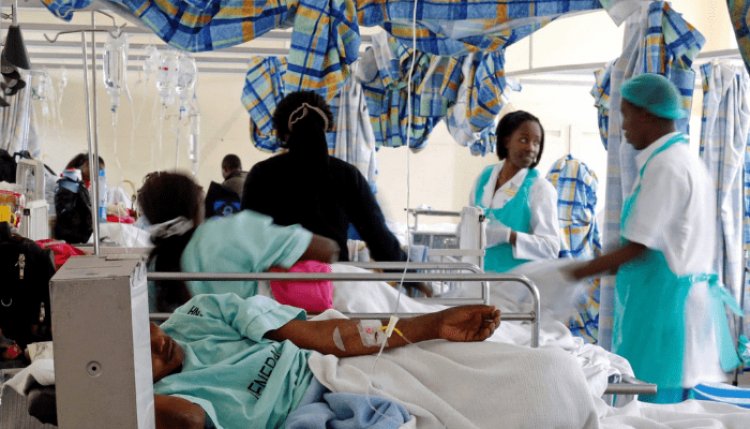No fewer than 92 African Civil Society Organisations (CSOs) have urged the House of Representatives to prohibit the use and consumption of Genetically Modified Organisms (GMOs) in the country to protect the environment and the health of citizens. The coalition made the recommendation at a public hearing on GMOs organised by Joint Committees on Agricultural Production and Services, Privatisation, Commercialisation, Public Asset, Science Engineering and Special Duties.
The coalition, which was led by the Health of Mother Earth Foundation (HOMEF), said that the rising cases of cancer and other related illnesses are traceable to the use and consumption of GMOs.
In a document presented to the committee by the Director of Programmes (HOMEF), Ms Joyce Brown, the coalition explained that GMOs are products of genetic engineering which is a technology that allows scientists to create plants, animals and micro-organisms by manipulating genes at the cellular level in a way that is not possible via traditional or natural processes.
According to them, it allows DNA from one type of organism to be introduced into another related or unrelated species; genetic manipulation is also done within a single organism. They said the campaign against GMOs is particularly against genetic modification of food crops and animals and any other genetic modification that will alter ecosystem balance, negatively impact agriculture, and destroy the local economy and foods. They said 19 European Union countries, four Asian countries, two African countries, and five countries in the Americas have banned GMOs.
According to them, up to 64 countries require manufacturers to label foods with GMOs as an increasing number of people around the world are choosing to eat organic and non-GMO products. The coalition cited an array of studies and research that concluded that the use and consumption of GMOs have adverse effects on consumers.
It further explained that GMOs have direct implications on biodiversity saying that over 80 per cent of GMOs are designed to be herbicide tolerant. According to them, this has significantly increased the use of herbicides in the U.S. For example, it is necessary to say that these herbicides are produced by the same companies that produce genetically modified seeds.
They said the herbicides do not only destroy the target weeds but also non-target organisms that are essential for soil health and overall ecosystem function.
“These chemicals can also run off to contaminate drinking groundwater and surface water, including drinking water sources.
“There is also the severe threat of irreversible genetic contamination due to cross-pollination, which could also lead to the production of uncontrollable plant varieties and mutated plant varieties,” they said.
The CSOs argued that farmers who have been given GM seed to plant, as well as extension workers, have complained that although GMOs may perform well in the first planting season in terms of productivity, their productivity drastically declines in the second planting season.
They explained that farmers cannot replant these seeds but have to continuously purchase the seeds every new season. The coalition reasoned that “This signifies an attempt at seed colonialism and loss of our heritage – forcing our farmers and by extension, consumers to depend on mostly foreign corporations for seed.
“GMOs do not improve yields. On September 23, the National Cotton Association of Nigeria (NACOTAN) reported that they “did not record any significant increase in their yields compared to the local seed varieties but instead, since the introduction of GM cotton seeds during the 2020/2021 farming season, yield per hectare has remained almost the same.
“The worrying aspect is where the cotton farmers reported that no other plant has been able to germinate on the farmlands where the GM seeds were planted, even after four years.
“The farm where we planted the GM seeds can no longer germinate our local seeds anymore. The land has been destroyed”.
The coalition said Nigerian communities and farmers in last the decade are steadily being ensnared into growing GM Crops. They said research conducted by the Health of Mother Earth Foundation in 2019 concluded that Nigerian farmers know too little about GMOs to make informed decisions.
Farmers given GM seeds to plant are, at best, told that the crops would not require too much spraying and would increase productivity, the coalition alleges.
“We demand a nullification of all the permits issued for the importation and release of genetically modified maize, beans, cotton and other sundry products into the country. These permits have been issued without regard for the complaints of millions of Nigerians and without the consent of many.
“A close surveillance of our markets and farms to halt illegal entry of GMOs into Nigeria and our food supply.
“An outright ban of all toxic agrochemicals, also known as highly hazardous pesticides – especially glyphosate-containing ones identified as probable carcinogens. Studies have shown that over 50% of pesticides, registered and used by farmers in Nigeria are classified as highly hazardous.
“This is our petition and the concern of millions of Nigerians. We are of strong opinion that the suggestions in this petition are taken into consideration. It will protect the best interest of the Nigerian people and Africa as a whole,” they said.
Some members of the coalition include Free Nigeria Alliance, Center for Food Safety and Agricultural Research (CEFSAR), Corporate Accountability and Public Participation for Africa (CAPPA), Women Environmental Programme and Food and Health Limited.
Others are Nigerians Against GMOs, Environmental Rights Action/Friends of the Earth Nigeria (ERA/FoEN) Nigeria Women Farmers Association (NIWAAFA), We the People, and Association of Women Farmers of Nigeria.
Also included in the coalition are Women and Youth in Agriculture, Udama Co-operative Farm, Green Alliance Nigeria, Women and Children Life Advancement Initiative, the Young Environmentalist Network (TYEN), Peace Point Action, and Social Action Committee on Vital Environmental Resources (COVER).












